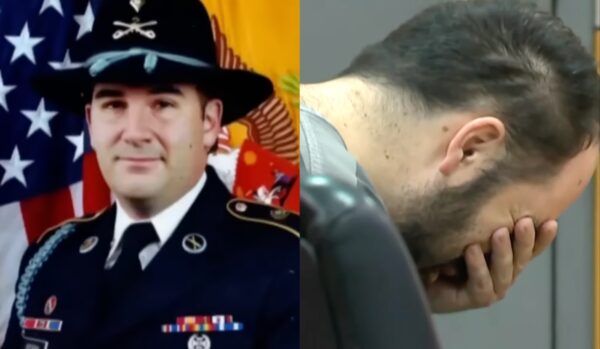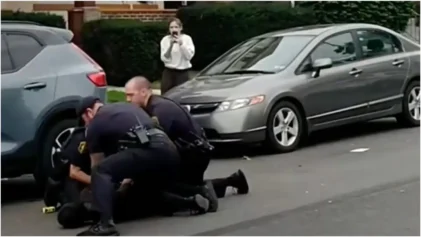A U.S. Army sergeant was sentenced to 25 years in prison on May 10 by a Texas judge for killing a protester during the 2020 summer of civil unrest.
Two very distinct portrayals of the soldier have been set forth.
The prosecution made the soldier out to be a racist, introducing bigoted text messages and social media posts that he either wrote, shared, or liked. The defense said their client is a man that acted in self-defense, suffering from post-traumatic disorder from his time being stationed in Afghanistan and being bullied as a kid.

Before hearing either side, the Lone Star State’s governor announced he would pardon him.
Daniel Perry was convicted on April 7 of fatally shooting 28-year-old Garrett Foster five times before driving away. His fate was in the hands of District Judge Clifford Brown, who after hearing the evidence presented sentenced the 36-year-old to 25 years in prison, which was recommended by the prosecution. Under the law, Brown could have sentenced Foster to life in prison.
Republican Gov. Greg Abbott has made public his desire to pardon Perry as soon as the request “hits [his] desk” under the state’s “stand your ground” law.
“Texas has one of the strongest ‘Stand your ground’ laws of self-defense that cannot be nullified by a jury or progressive district attorney,” Abbott said in a statement posted to Twitter almost 24 hours after a jury convicted Perry of Foster’s murder. “I will work as swiftly as Texas law allows regarding the pardon of Sgt. Perry.”
Travis County District Attorney José Garza said after the sentencing, “This is not a normal case because in early April the Texas governor made a decision to insert politics into this case and requested the Board of Pardons and Parole to review this case less than 24 hours after the jury issued a verdict.”
The parole board, which is filled with appointees by the governor, is still considering whether to recommend Perry for a pardon, which is required under Texas law for the governor to issue a pardon.
Perry’s and Foster’s lives intersected in a variety of ways. Both were white men. Both had served in the nation’s military, were legally permitted to carry firearms, and were in downtown Austin on July 25, 2020.
However, the two were in downtown Austin for different reasons, according to police reports.
Foster was there to protest the death of George Floyd, a victim of police-involved violence. While at the demonstration, he was visibly carrying his AK-47 at the demonstration, protesting against racial injustice and the many Black people killed at the hands of law enforcement.
Perry, who was stationed 70 miles north of Austin at Fort Hood, was working as an Uber driver and had just finished dropping off his last passenger. Authorities say he turned down a street full of protesters, ones he later would say he believed were blocking him. He said during the trial he saw Foster pointing his rifle at him and in a split second he shot him in self-defense.
Witnesses dispute this story, saying they did not see Foster raise his gun, News 10 reported.
Prosecutors argued Perry could have driven away but chose not to. They said Perry ran a red light into an area where he could easily see the marchers before he drove into them. The crowd did not swarm him as he suggested.
Forensic psychologist Greg Hupp testified during the sentencing hearing this week that he believed Perry suffered from post-traumatic stress disorder from his time in the military, where he witnessed a soldier shooting himself in the head. The stress of being around the Black Lives Matter protesters could have triggered some of the trauma of seeing someone die by suicide.
“He turned and then looked up, and there was a crowd and very quickly what he perceived was a weapon,” Hupp said. “I don’t see there was intention.”
However, the soldier did have negative feelings about the crowds protesting Floyd’s death and expressed them often, according to the prosecutors who submitted text messages and social media posts to the court to review before the sentencing.
This evidence was not presented during the trial. However, it was publicly released after he was convicted last month.
Days after Floyd’s killing, Perry texted his friends regarding the protests, writing, “I might go to Dallas to shoot looters.”
One post written in June 2020 said, “It is official I am a racist because I do not agree with people acting like animals at the zoo.”
Perry’s attorney Douglas O’Connell said many of the text messages and posts were out of context, thus he objected to their use as evidence at trial. While saying a lot of the memes were “disgusting,” he added others were just examples of his “dark humor” and “barracks humor.”
Garza hopes the sentencing has “brought some sense of justice for the Foster family and for (wife) Whitney and her family.”
Though convicted, Perry is still considered enlisted but classified as in “civilian confinement,” according to Army spokesman Bryce Dubee.
He is currently assigned to Fort Wainwright, Alabama. The rep says his status does indicate he is pending separation from the military.
Perry’s defense team plans to appeal.


